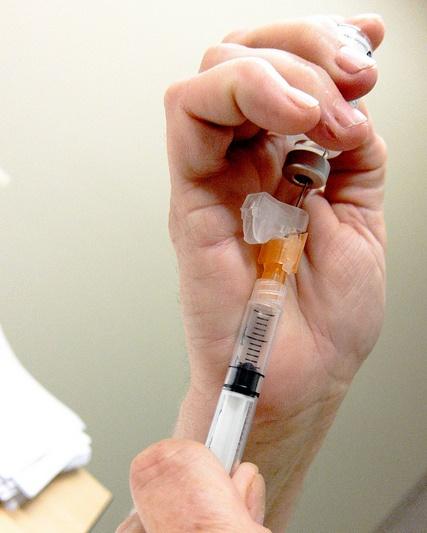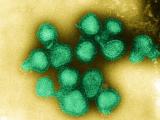Inactivated influenza vaccine (IIV) efficacy waned in younger adults yet remained fairly high over a flu season, while live attenuated influenza vaccine (LAIV) efficacy did not wane, according to a study yesterday in The Journal of Infectious Diseases.
Researchers from the University of Michigan and the US Centers for Disease Control and Prevention studied flu vaccine efficacy over the 2007-08 flu season in 1,952 healthy adults age 49 and younger, with an average age of 23.
Participants received IIV (814 people), LAIV (813), or a placebo (325) in October or November 2007, and antibody titers were measured before vaccine was given, 30 days after vaccination, and at the end of the flu season.
The efficacy of IIV was 70% (95% confidence interval [CI], 50%-82%) overall and 73% against H3N2, the season's predominant strain. Efficacy was much lower for LAIV, at 38% (95% CI, 5%-52%) overall and at 30% against H3N2, the authors said.
Flu infection occurred in 28 people in the IIV group, 56 in the LAIV group, and 35 who received placebo. About 83% of total cases occurred during the flu season's peak, with the remaining cases detected in the last 9 weeks of the season.
Vaccine efficacy for IIV significantly waned, yet still offered protection during 12 of the flu season's 16 weeks. It was below 50% by April 2008.
Hemagglutinin antibody titers for IIV recipients were 7.8 times higher than those in the placebo group 30 days after vaccination and dropped to 3.7 times higher than placebo by the end of the season. Neuraminidase titers waned less substantially over time, from 2.4 times to 1.8 times greater than placebo.
LAIV efficacy rapidly decreased over the first months of the flu season, followed by a rapid increase, yet offered protection only during 7 weeks. Overall its efficacy did not wane over the course of the season Hemagglutinin and neuraminidase titers for LAIV showed no significant drop and were similar to titers in the placebo group over the course of the season, the authors said.
Although the study demonstrated that IIV efficacy has the potential to wane while still offering protection, the authors said there is no evidence-based reason to delay flu vaccination until later in the season, and that people should be vaccinated at the earliest opportunity.
Need for mix of science, feasibility
In a related commentary in the journal, Kathleen M. Neuzil, MD, MPH, of the University of Maryland School of Medicine's Center for Vaccine Development, notes that the authors analyzed a population in which almost 90% were under the age of 35.
Given published associations between waning vaccine efficacy in young children and older adults, more research is needed on seasonal flu vaccine protection in these populations and on whether it makes sense to delay vaccination for elderly populations until late October, she said.
Neuzil argues that most campaigns should focus on increasing access to flu vaccine as early as possible, especially for children, though timing of vaccination depends significantly on the variable natures of vaccine arrival and flu season onset. Implementing evidence on the waning of vaccine efficacy into local practice will require the "right mix of science and feasibility," Neuzil said.
See also:
Apr 19 J Infect Dis study
Apr 19 J Infect Dis commentary



















